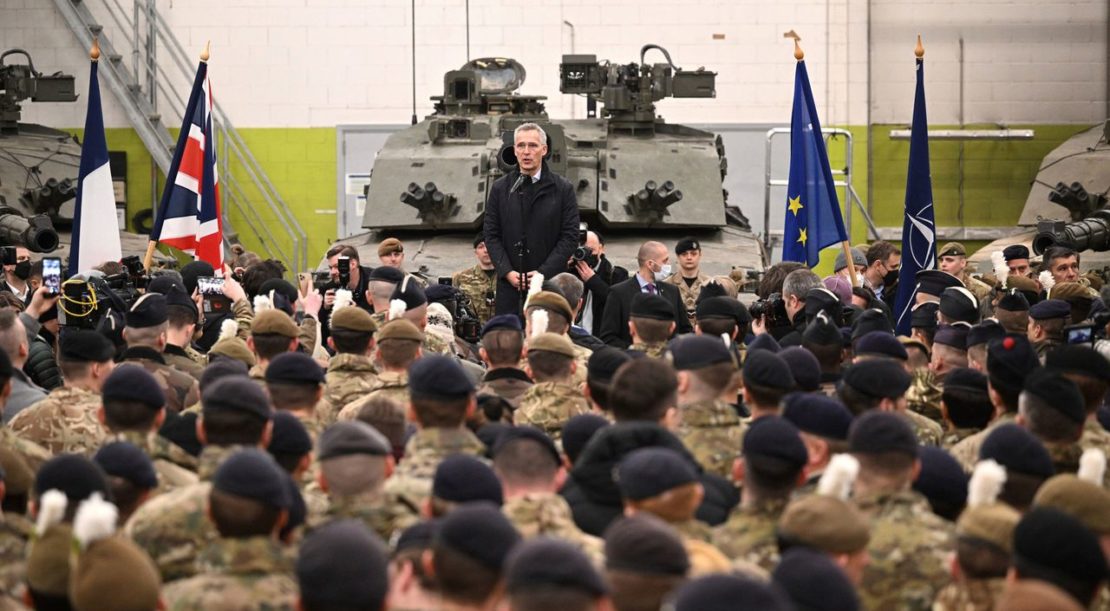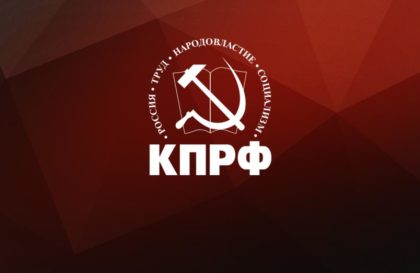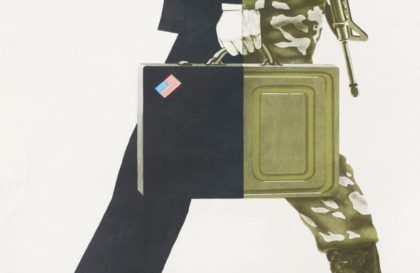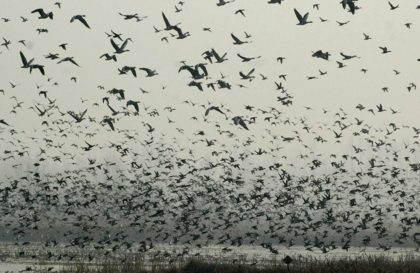Il devrait être de plus en plus difficile pour la classe politique française, la gauche en particulier de se conformer au narratif de la propagande officielle en faveur de la guerre, mais comme celle-ci reçoit le puissant soutien des « élites médiatico-politiques », toutes sans exception, le camp militaro-financier peut impunément faire comme s’il n’y avait aucune relation entre la politique de destruction des service publics, de pression sur les salaires sur l’emploi et la guerre. Pourtant il suffit de lire les déclarations de Jens Stoltenberg, au Whashington post ci-dessous pour savoir ce qu’il en est de la manière dont on nous vend cette guerre. L’Humanité devrait publier ce genre de chose et titrer en une, enfin l’humanité d’un autre parti communiste que celui qui promeut Vincent Boulet et les siens, même pas des trotskistes anti-impérialistes comme ceux qui écrivent cette dénonciation, non le courant trotskiste comme celui qui reçut jadis le titre d’hitlero-trotskiste et chez qui la haine du communisme et de l’URSS l’emporta sur tout, des alliés de Glucksman.
Andre Damonil y a 10 heures
Depuis le début de la guerre en Ukraine en 2022, la Maison-Blanche et l’ensemble des médias américains clament que le conflit est une « guerre non provoquée », déclenché le 24 février 2022 par un seul homme, Vladimir Poutine.
L’expression «non provoquée» est devenue omniprésente dans la description de la guerre par les médias américains. Le Washington Post, le New York Times et les journaux télévisés l’ont utilisée des centaines de fois.
Dans une tribune publiée mercredi, Thomas Friedman, transcripteur en chef des notes de renseignement de la CIA pour le Times, écrit: « Depuis le début de cette guerre, il n’y a qu’un seul endroit où l’on puisse être pour comprendre son calendrier et sa direction – et c’est dans la tête de Vladimir Poutine… Cette guerre est sortie entièrement de là ».
Le mantra de la « guerre non provoquée » est devenu pour l’Ukraine ce que les « armes de destruction massive » ont été pour la guerre d’Irak, ou « Souvenez-vous du Maine » pour la guerre hispano-américaine.
L’idée qui sous-tend cette répétition sans fin est la théorie que « plus le mensonge est gros, plus il est facilement cru ». Le public est censé accepter qu’il s’agit de la première guerre de l’histoire sans antécédents historiques ni motifs économiques, la première guerre entièrement basée sur la psychologie d’un seul homme.
Mais mardi, le Washington Post a publié une interview du secrétaire général de l’OTAN, Jens Stoltenberg, qui a déclaré que la guerre en Ukraine « n’a pas commencé en 2022. La guerre a commencé en 2014 ».
Stoltenberg a poursuivi: « Et depuis, l’OTAN a mis en œuvre le plus grand renforcement de notre défense collective depuis la fin de la guerre froide… Jusqu’en 2014, les alliés de l’OTAN réduisaient leurs budgets de défense. Depuis 2014, tous les alliés européens et le Canada ont considérablement augmenté leurs dépenses de défense… C’est là une énorme transformation de l’OTAN qui a commencé en 2014 ».
Ainsi, selon Stoltenberg, la guerre n’a pas commencé en février 2022, avec l’invasion russe de l’Ukraine, mais en 2014, huit ans plus tôt.
Cet aveu confirme deux choses que le World Socialist Web Site n’a cessé de souligner depuis le début de la guerre. Premièrement, le conflit a un arrière-plan historique. Deuxièmement, l’invasion de 2022 était une réponse désespérée aux efforts croissants de l’OTAN pour placer l’Ukraine dans son orbite.
What is the future of the war in Ukraine? NATO’s leader offers insight.

By the Editorial Board
May 9, 2023 at 9:12 a.m. EDT
NATO Secretary General Jens Stoltenberg outside the White House on June 2, 2022. (Demetrius Freeman/The Washington Post) (The Washington Post)
Jens Stoltenberg is the 13th secretary general of NATO, a position he has held since 2014. Before that, he twice served as prime minister of Norway, for a total of nine years. The Post Editorial Board asked him about the Ukraine war and other critical issues for the alliance. The interview, which took place last week at NATO headquarters in Brussels, has been edited for length and clarity.
Lee Hockstader, Washington Post Editorial Board: How has the war led NATO to recalibrate its defense posture and doctrine?
NATO Secretary General Jens Stoltenberg: The war in Ukraine has fundamentally changed NATO, but then you have to remember the war didn’t start in 2022. The war started in 2014. And since then, NATO has implemented the biggest reinforcement of our collective defense since the end of the Cold War.
For the first time in our history, we have combat-ready troops in the eastern part of the alliance, the battle groups in Poland, Lithuania, the Baltic countries, actually the whole eight battle groups from the Baltic Sea down to the Black Sea. Higher readiness of our forces. And increased defense spending. Until 2014, NATO allies were reducing defense budgets. Since 2014, all allies across Europe and Canada have significantly increased their defense spending. And we have modernized our command structure, we have more exercises, we have established new military domains like cyber. So in totality, this is a huge transformation of NATO that started in 2014.
Hockstader: Despite that, only seven NATO members have met the alliance’s target of spending 2 percent of GDP on defense.
Stoltenberg: First of all, compared to where we were in 2014, there’s a huge difference. Because until 2014, we were going down. Now, we’re going up.
Second, NATO allies in total, across Europe and Canada, have added $350 billion for defense spending since 2014, which is significant. More and more allies meet the 2 percent target, and almost all allies have plans in place to be there within a few years. And, of course, the war in Ukraine has demonstrated the importance of investing.
Hockstader: What does a plausible way forward to Ukraine’s eventual membership in NATO look like?
Stoltenberg: First of all, all NATO allies agree that Ukraine will become a member of the alliance. All allies agree that Ukraine has the right to choose its own path, that it is not for Moscow, but for Kyiv, to decide. And thirdly, all allies agree that NATO’s door remains open. Then the question is when, and I cannot give you a timetable on that.
What I can say is that we are now working with them, to help them transition from Soviet-era equipment, doctrines and standards to NATO doctrines and standards, to make their armed forces interoperable with NATO forces, and to help them to further reform and modernize their defense and security institutions.
The urgent task now is to ensure that Ukraine prevails as a sovereign, independent nation, because if Ukraine doesn’t prevail, then there is no issue to discuss at all.
Hockstader: We’ve seen no real moves toward nuclear deployment by Russian President Vladimir Putin. In fact, China has warned against that, which should carry some weight in Moscow. Should the world still regard these nuclear threats as credible?
Stoltenberg: NATO has fundamentally two tasks in the war. One is to support Ukraine, as we do. The other is to prevent escalation. And we prevent escalation by making absolutely clear that we are not party to the conflict, and by increasing military presence in the eastern part of alliance as we have done — with 40,000 troops under NATO command backed by substantial naval and air forces.
There’s a constant discussion about what more types of weapons we should provide, and there are consultations going on among allies, also on the issue of fighter jets. As important as discussing new systems is, it is also extremely important to focus on the sustainment of all the systems we have already delivered — ammunition, spare parts, maintenance.
Hockstader: In the Discord leaks, we saw that American intelligence assesses a small likelihood of major territorial changes arising from the coming Ukrainian offensive. Do you share that assessment?
Stoltenberg: So, first, I will not confirm the information in those leaks, and we know that at least some of them are manipulated and not correct.
Second, the Ukrainians have proven they are able to retake territory.
Thirdly, since the winter, when these alleged leaks took place, there has been an enormous and unprecedented supply of new weapons and ammunition and spare parts and training. So NATO allies and partners have trained this winter more than nine brigades, which are now fully equipped, fully manned and well trained. And that’s a significant fighting power, including 230 battle tanks, heavy armor. And a lot of modern weapons systems.
Hockstader: Is it plausible that China could play a diplomatic role in negotiating an end to the war?
Stoltenberg: So far, they have not been able to condemn the illegal invasion of Ukraine, but I welcome that conversation between President Volodymyr Zelensky and President Xi Jinping.
What happens in Europe matters for Asia, and what happens in Asia matters for Europe. Because if President Putin wins in Ukraine, it’s a tragedy for the Ukrainians. But it’s also dangerous for all of us. Because that will send a message to President Putin, but also to President Xi, that when they use military force, they get what they want. And that will make us more vulnerable.
Hockstader: Obviously, NATO is about the North Atlantic, not the Pacific, and yet in a war over Taiwan, American military bases in the Pacific could easily be targets. Can you imagine any scenario in which NATO is involved in conflict with China?
Stoltenberg: Yes, NATO will remain an alliance of North America and Europe, it will not become a global alliance with members from Asia, and our collective security guarantee applies for NATO territory. Second, any conflict in and around Taiwan will have profound consequences for all of us. Trade, 50 percent of container freight, ships go through the Taiwan Strait. A significant amount of all of the world’s semiconductors are produced in Taiwan. So the economic and trade consequences of conflict in Taiwan will be enormous immediately. And then, of course, military conflict will also matter for NATO and NATO allies.
Hockstader: Tell me, please, your assessment of French President Emmanuel Macron’s ambitions for European strategic autonomy.
Stoltenberg: We welcome European Union efforts on defense. What we must avoid is duplication and competition, partly because the E.U. cannot defend Europe. Eighty percent of NATO’s defense expenditure comes from non-E.U. allies. It’s also about geography. If you look at the NATO map, Norway in the north, and Turkey in the south, but also of course the U.S., Canada and the United Kingdom, they are critical for the defense of Europe.
And then politically, any attempt to weaken the bond between North America and Europe will not only divide NATO; it will divide Europe. If there’s anything we have learned from the war in Ukraine, it is that North America and Europe have to stand together. Non-E.U. NATO allies like the United States, Canada and the United Kingdom have trained Ukrainian forces since 2014. And, of course, they’re providing a substantial part — 78 percent of the support to Ukraine comes from non-E.U. NATO allies.
Hockstader: What would a second Trump administration mean for U.S. leadership or NATO?
Stoltenberg: I was secretary general during the period when Donald Trump was president of the United States. Of course, there were some disagreements among NATO allies on different issues, ranging from climate change to the Iran nuclear deal. But the reality is that on NATO issues, we were actually able to do more together. And again, that demonstrates the strength of NATO, that we have always been able to unite around the core values.
Hockstader: Polls show an erosion of support for Ukraine, particularly among Republicans.
Stoltenberg: I’m absolutely confident that the strong U.S. bipartisan support for Ukraine will remain, not least because this is in the security interest of the United States. A strong NATO is good for Europe, and support for Ukraine is also good for the United States, especially when we see the security challenges posed by China.
No other major power has 30 friends and allies as the United States has in NATO. Neither Russia nor China has anything similar. And together, NATO allies represent 50 percent of the world’s military might and 50 percent of the world’s economic might. So even the United States, which is of course by far the biggest ally, needs friends. If President Putin wins, it’s a tragedy for Ukrainians and dangerous for all of us, including the United States.
Hockstader: Would a Russian attack on critical infrastructure like undersea cables owned by NATO members or companies cause the invocation of NATO’s Article 5?
Stoltenberg: That’s for NATO to decide. We are now looking into how can we do more when it comes to sharing intelligence, including with the private sector, to detect any potential threats. That’s one thing. The other is presence, military presence, as a way to deter but also to monitor.
We cannot protect every inch of every internet cable, but presence helps to reduce the risks and reduce the possibility for Russian deniability. We’ve seen over the last years that Russia is not seeking a full-fledged confrontation with NATO, triggering Article 5, but they’re trying to operate below the Article 5 threshold. Meaning with hybrid, cyber, covert actions. And, of course, attacks against undersea infrastructure — it’s easy to deny because it’s hard to monitor.
The Post’s View | About the Editorial Board
Editorials represent the views of The Post as an institution, as determined through debate among members of the Editorial Board, based in the Opinions section and separate from the newsroom.
Members of the Editorial Board and areas of focus: Opinion Editor David Shipley;Deputy Opinion Editor Karen Tumulty; Associate Opinion Editor Stephen Stromberg (national politics and policy); Lee Hockstader (European affairs, based in Paris); David E. Hoffman (global public health); James Hohmann (domestic policy and electoral politics, including the White House, Congress and governors); Charles Lane (foreign affairs, national security, international economics); Heather Long (economics); Associate Editor Ruth Marcus; Mili Mitra (public policy solutions and audience development); Keith B. Richburg (foreign affairs); and Molly Roberts (technology and society).
Views: 6







CROCE
La première des choses à faire, si vous voulez que nous comprenions les véritables raisons de cette guerre en Ukraine, déclenchée par le méchant Poutine ( mais alors, qu’est-ce qu’il est méchant ce Vladimir Vladimirovitch Poutine ! ), c’est de ne pas employer la langue des nazis anglo-saxons qui l’ont organisée !
A savoir : Boris Johnson, Jens Stoltenberg, George W Bush, Victoria Nuland ( la porteuse de pain ), Hillary Clinton, et » Jojo le tremblant « , sorti de son EPHAD de la Maison-Blanche ( la marionnette en fin de vie dont la CIA, la NSA, le FBI, le Pentagone, la NRA, et le complexe militaro-industriel tirent les ficelles ).
Sans oublier d’autres nazis polonais, baltes, et ukrainiens comme Stepan Bandera !
Nous lui devons entre-autres, le massacre d’Oradour sur Glane quand il sévissait avec ses copains de l’OUN-B au sein de la Panzer-division SS Das Reich !
Parlez-nous plutôt des massacres de populations civiles, commis à Kiev, à Odessa, à Marioupol, et dans le Donbass à Debalsevo, Donetsk et Lougansk ( environ 15.000 morts ), par ces joyeux drilles !
Mais là, il n’y a plus personne pour témoigner ( à part quelques journalistes courageux, venus de tous pays, qui méritent leur carte de presse ).
C’est sûr qu’il vaut mieux jouer au journaliste du côté de ceux qui tirent les obus, plutôt que de ceux qui les reçoivent tous les jours !
Quoique nous ayons à déplorer la mort d’un journaliste français qui se croyait du bon côté !
On dirait que quelque chose est en train de changer !
Rendez-vous à Kiev, pour le prochain épisode ! ( pourquoi ont-ils supprimé la peine de mort en Russie